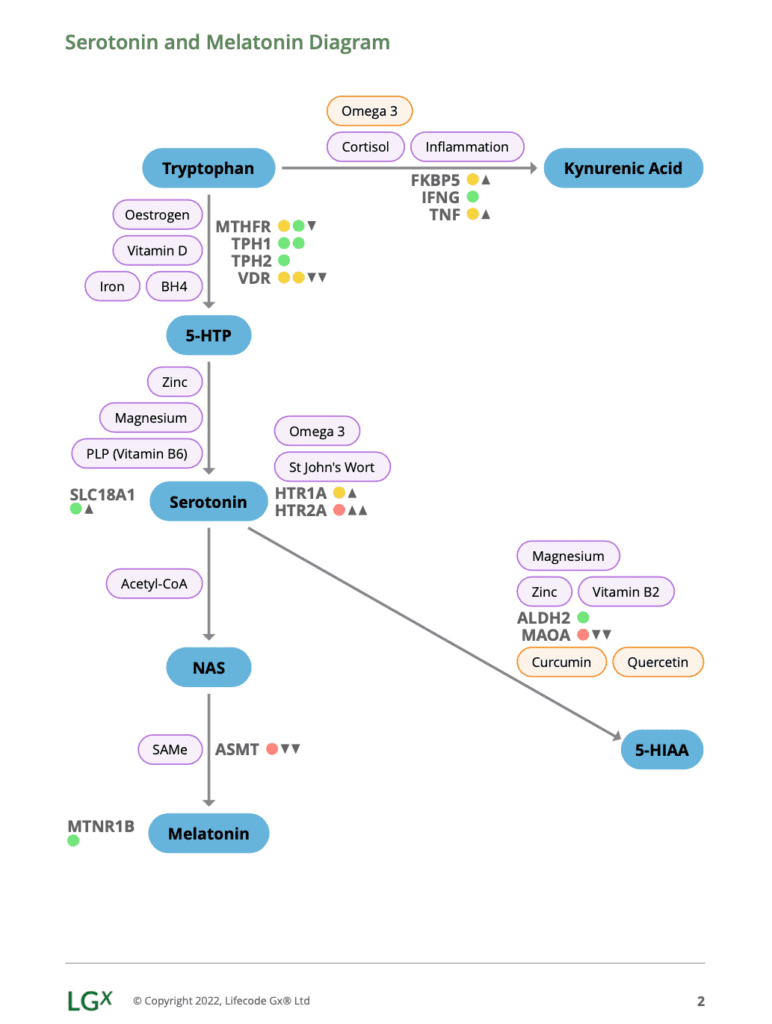Can a change in diet really impact your mental health? And if so, how? There is research that demonstrates the positive impact diet and have on mental health and I myself have first hand experience of it.
Seven years ago I adopted the autoimmune paleo (AIP) diet to help manage symptoms of rheumatoid arthritis. I was hopeful AIP would positively impact the physical symptoms I was dealing with (joint pain, fatigue) what I hadn’t expected was a significant improvement in my mental health.
Within a couple of weeks of eating my new anti-inflammatory, nutrient dense diet I noticed a number of things:
- Less anxiety and far fewer panic attacks
- Less low mood and a generally more positive outlook
- More clarity of thought and less brain fog
- The ability to experience joy for the first time in several years
Whilst I didn’t understand the mechanisms behind these positive changes at the time, recent experience of DNA testing and training in nutrigenomics has made it much clearer….
Introducing nutrigenomics
Each and every one of us is unique. Variations in our genome (DNA) contribute to our individuality and can have significant impacts on our life and health.
Nutrigenomics is an exciting new science which explores the interaction between nutrition and genes, with a view to improving or preventing disease. It really is the ultimate in personalised nutrition!
As part of my training with Lifecode Gx I had the opportunity to test my own DNA and the results were fascinating. I’ve outlined some of the findings from my ‘Nervous system’ report below.
Once your DNA has been sequenced the results are presented as a series of diagrams representing different pathways in the body. The example below is my serotonin/melatonin pathway. Serotonin is often referred to as our ‘happiness neurotransmitter’ it is associated with wellbeing. Melatonin is a sleep hormone and also helps regulate our circadian rhythm (the body’s natural time clock).

Traffic light system
Genes are identified by their short name eg. MTHFR, TPH1 and are colour coded green, amber or red according to which variant you have.
Red = the effect of the variant is negative
Amber = the effect of the variant is somewhat negative
Green = no variation or the effect of the variant is positive
The arrows alongside the colour coding illustrate whether the variant increases or decreases the activity of the gene.
Cofactors and inhibitors
The items in purple bubbles are cofactors ie. they will improve the function of that step in the pathway.
Those in orange are inhibitors and will hinder the function of the pathway.
Here’s what I learned from testing my DNA…
VDR Gene
The VDR gene relates to vitamin D receptors and vitamin D is a cofactor in the first step of producing serotonin from the amino acid tryptophan. As you can see I have 2 amber variants on my VDR gene, which downregulate its function. This means I have lower sensitivity and response to vitamin D and consequently reduced synthesis of serotonin.
What action should I take?
It’s important that I optimise my vitamin D status. I aim to have a level that’s towards the upper end of normal. I keep track of it by testing my levels year to year and supplement as appropriate.
HTR genes
HTR1A and HTR2A code for serotonin receptors. Again you can see I have suboptimal variants; 1 amber and 1 red. These variants inhibit serotonin release and lower sensitivity to serotonin. Over time they can also result in serotonin resistance, so more serotonin is needed to have an effect. Consequently they are associated with an increased risk of anxiety and depressive disorders.
What action should I take?
Include plenty of tryptophan in my diet, along with all the cofactors (purple) that support production of serotonin, to give my body the best chance of making the serotonin I need to feel good.
FKBP5 & TNF Genes
You’ll notice I also have a couple of amber genes on the pathway that branches out from tryptophan to kynurenic acid. This pathway can ‘steal’ tryptophan from the serotonin pathway, so having upregulated genes in this pathway isn’t helpful. Inflammation also increases activity of this pathway, hence its appears as a cofactor in purple.
What action should I take?
Reduce inflammation by eating an anti-inflammatory diet, managing stress, focussing on good quality sleep and reducing my exposure to toxins. Again, make sure I have adequate tryptophan in my diet.
MAOA Gene
The MAOA gene is involved in the breakdown of serotonin. As you can see I have a red and double down arrow in relation to this gene. Whilst that may sound very bad(!) in this instance it could actually work in my favour.
My downregulated MAOA gene means the serotonin I am able to make will be cleared less quickly. Having serotonin linger for longer before being broken down may offset some of the challenges further up the pathway in terms of producing serotonin.
How does this translate in real life?
I experienced huge improvements in my mental health when I changed my diet, and having seen my DNA I know better understand why. By reducing my levels of inflammation, increasing my protein levels and supplementing with vitamin D, I addressed many of the genetic ‘weaknesses’ outlined above.
The power of nutrigenomics is that it’s unique to you, there is no ‘one size fits all’. We’re able to identify and target specific pathways and provide nutritional support to tackle current symptoms and reduce future health risks.
If you’re interested in nutrigenomics testing, take a look at my DNA health package options or get in touch to learn more.
